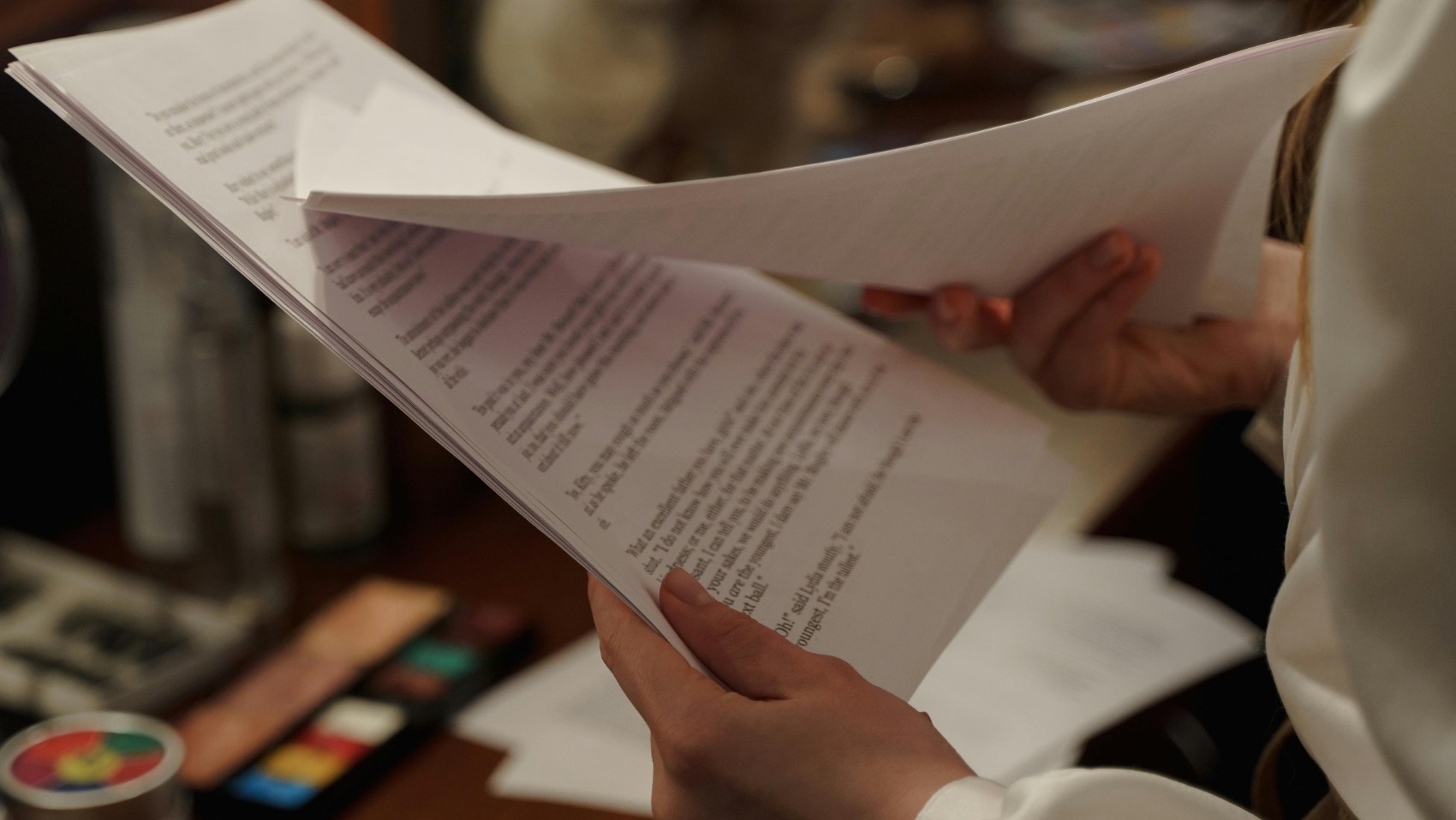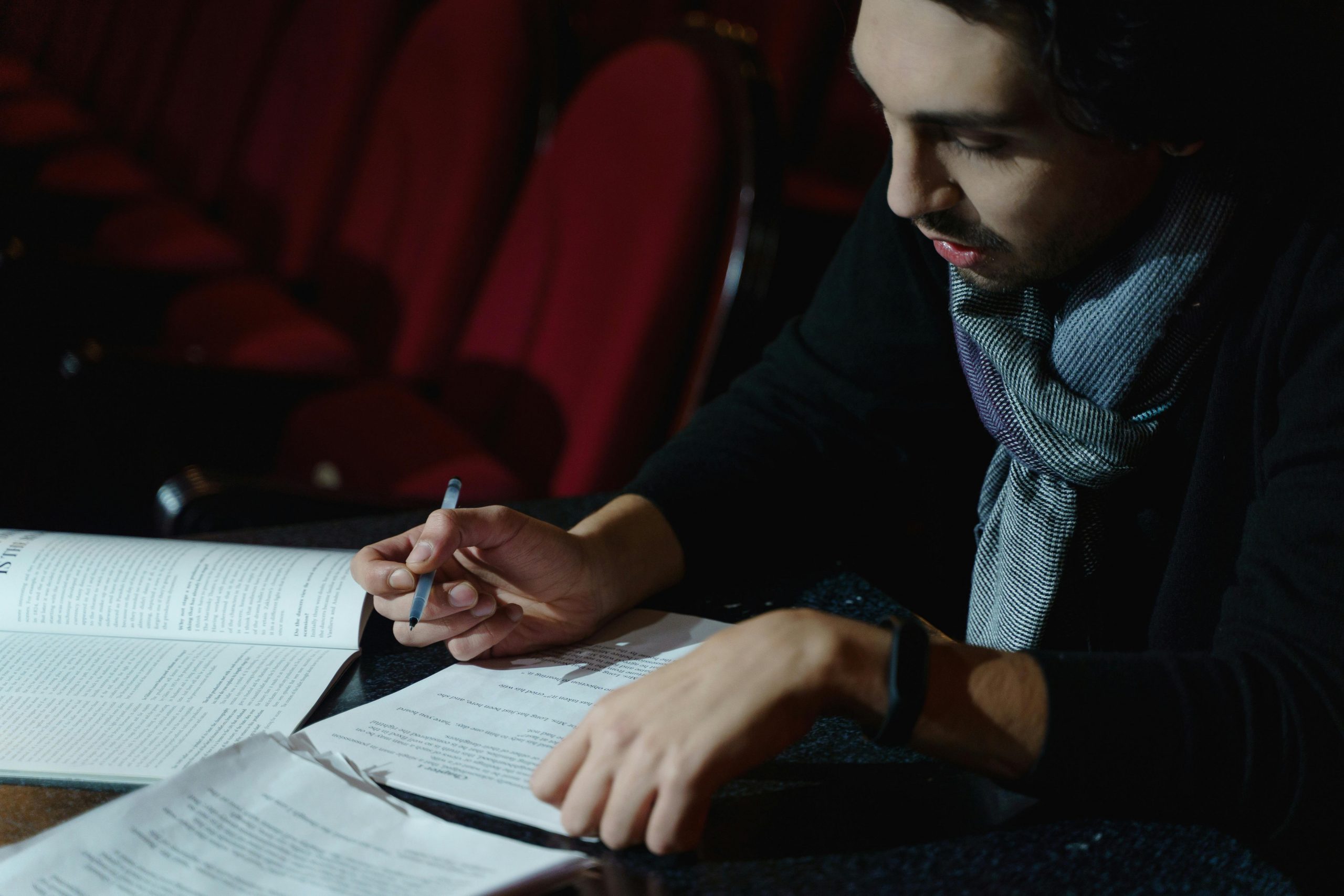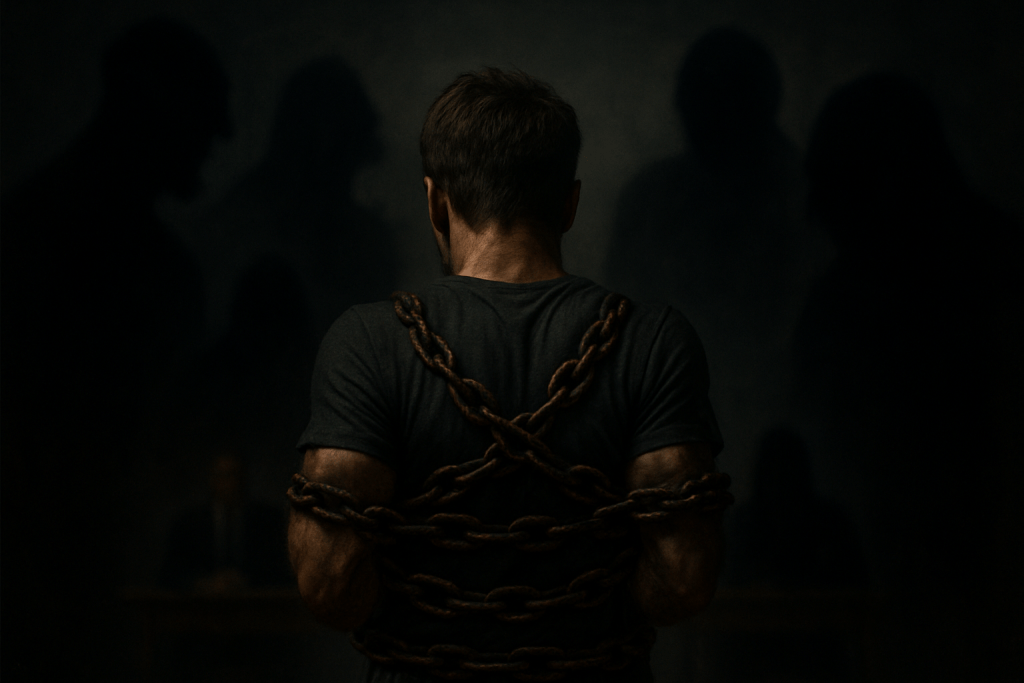Auditions are a fact of life for actors. Everyone dreams of reaching that level of success where auditions are no longer a factor in their career, but the truth is very few actors are ever that lucky. The truth is you find yourselves auditioning all the time – chasing the dream of success, pursuing that next role. The goal feels clear: book the job. But here’s the uncomfortable truth: that decision is always out of your hands. The moment you leave the audition room, the decision belongs to someone else entirely.
This creates a peculiar kind of trap. When booking becomes the only measure of success, it’s easy to slip into all-or-nothing thinking. You either win or you lose. You’re either chosen or rejected. And when the audition rejection comes – as it so often does – it’s easy to forget that the casting decision isn’t a judgement about you as a person. The disappointment lands heavy, and before you’ve had a chance to breathe, you’re already chasing the next audition, hoping this time will be different.
But what if there was another way to think about this? How would it be if instead of fixating on the one objective you can’t control, you developed a strategy for everything else – including not booking the job?
The Habit of Reacting vs. Building Audition Resilience
As humans, we evolve habitual ways of doing things because it makes life easier than having to put our full attention on everything we do. Habits free up mental space to get on with our busy lives. But they can also make it hard to evaluate whether these habitual patterns are actually moving you closer to your goals – or acting as an obstruction.
For many actors, the pattern becomes: audition, wait, hope, hear no, feel crushed, move on. Repeat. There’s rarely space to pause and reflect. And when you’re caught in a state of fight or flight – anxious about judgement, braced for rejection – your nervous system keeps you focused on coping with the emotional fallout rather than formulating a plan that might actually help you move forward. I have mentioned before how the fight and flight response plays a large part in creating performance anxiety.
This is where a reflection practice becomes a vital part of building audition resilience.
Gathering the Evidence
As a cognitive behavioural hypnotherapist, a big part of my work is helping people gather evidence about the situation that’s challenging them. What are the automatic thoughts that crowd your mind during preparation, the audition itself, and the aftermath? What behaviour patterns either help or hinder you? What core beliefs are operating below the level of conscious thought?
A good first step is simply to identify what it is you actually do. And there’s no better way to do that than to start observing and recording how you think, feel, and behave as you prepare for and take part in every audition.
No matter what issue I work with a client on, this makes a good starting point. If you want to change something, it’s useful to know what’s your baseline approach and mindset. Each client is unique and understanding how they are affected my audition rejection helps to develop a strategy that helps rewrite their script for how they prepare, perform and respond.

What You Might Discover
One of the first things clients often find is how automatic, repetitive, and negative their thinking patterns are. The same can be said about the way they prepare. Perhaps you put off learning lines or filming a self-tape. Perhaps you over-prepare, spending hours shooting the scene again and again. Maybe before you even start, you’ve talked yourself out of getting the job – or you’ve already started spending the money in your head.
Perhaps you obsess about all the auditions that didn’t go your way in the past. Perhaps you catastrophise about all the things that could go wrong this time.
One thing you’re likely to realise is how much time you spend dwelling on the past or the future – and how little you’re invested in the here and now, which is the only moment when inspired performances actually happen.
If you begin to take notice of your preparation style, you can start to identify the things you yourself would like to change. And here’s an important thing I say to every client: You are a good auditioner. You have everything you need to be great at auditions. The challenge isn’t so much what you have to change about yourself as to change what you do that gets in the way of revealing your unique talent and presence.
So often, in being so focused on getting the job, each audition becomes a unique challenge you either win or lose, rather than one more step on the path of your career. something you can reflect on, be inspired by and use as the impetus for growth and self-discovery.
What You Can Actually Control
It’s really important to accept the things you have control over – and let go of the rest.
As an actor, you can:
- Prepare for the audition and give as much time to your preparation as is practical
- Arrive on time
- Maintain an up-to-date online presence on social media, and casting websites such as Spotlight
- Dress appropriately
- Act in a professional manner
- Research the company, the job, and the people involved
- Work on your inner preparation – managing tension, nerves, and your audition strategy
- Be present, curious, and reflective
- Continue to develop your skills
- Build a network of peers that you can get feedback from
- Review your performance afterwards to find places where you can make incremental improvements
These aren’t small things. They’re the foundation of a sustainable audition practice. And crucially, they’re all within your reach.

Reframing the Audition Room
When I ask, “What’s your strategy for not booking the job?” – I’m not encouraging you to give up on booking jobs. Of course the aim is to book as many jobs as possible. What I’m talking about is a mindset shift – away from the all-or-nothing towards a career-focused mindset. One that doesn’t collapse when the outcome isn’t what you hoped.
By focusing on what it’s possible to improve, you free up working memory. Instead of your mind being crowded with anxiety about the outcome or rehearsing all the ways this might go wrong, you can actually be present and curious during the audition itself. That presence – that availability – is precisely what casting directors are looking for.
Instead of having to start from scratch after every disappointment, you’re already focused on the next thing. By developing a practice of reflecting afterwards on what went well and what you might do differently next time, you reframe yourself as an experimenting actor. The audition room becomes a laboratory – a place to try out new strategies, to notice what lands, to refine your craft.
Understanding why you feel negative after an audition helps you develop a better strategy for the next time.
It’s also important to remember that an audition is a bit like speed dating. Chemistry matters. Often, the decision to book is based on subliminal reasons – fit, timing, someone else’s vision. The audition room isn’t the place to be second-guessing yourself. And here’s the sad truth: you can never know the complete reason why you book or don’t book a job.
A very good place to start, though, is to avoid the assumption that you’re broken, not good enough, or a failure.
Because here’s something worth considering: if you’re auditioning regularly, you’re already succeeding. Getting in the room repeatedly means casting directors are interested in seeing what you can do. That’s not failure – that’s career momentum. The trap is measuring success solely by bookings, when actually, regular auditions are themselves a sign that you’re doing something right.
Building a robust and resilient audition process that makes room for the ups and downs of the casting experience is an important part of developing a progress-focused audition mindset. Not every audition will lead to a booking, but every audition can contribute to your development as a performer.
Building Audition Resilience That Works for You
The truth is, there will always be more auditions. By planning for the next audition – and the one after that – it becomes easier to develop an audition mindset that works in your favour rather than against you.
This isn’t about lowering your expectations or protecting yourself from hope. It’s about building resilience through reflection, incremental change, and a habit-based approach that supports you whether you book or not.
Because booking the job is wonderful when it happens. But it can’t be the only thing that defines your success. The work you do between auditions – the noticing, the adjusting, the steadying of your nervous system, the quiet reclaiming of your presence – that’s the work that actually sustains a career.
So: what’s your strategy for not booking the job?
If the answer is “I don’t have one,” then maybe that’s where we begin.
So How Can Hypnotherapy Help with This?
An important part of building audition resilience is accepting that you are only human and sometimes you need help to work through the limiting thoughts, emotions, and behaviours. I often liken working with me to rehearsing with a director – it’s not that you can’t give a great performance, but sometimes an expert outside eye can get you there that little bit quicker, and help you find the depths to your performance you hadn’t quite thought of.
As a hypnotherapist with over thirty years as an actor, I merge both disciplines together. I have stood in countless audition rooms, and thinking about these questions is what led me to train as a therapist.
Going to an audition doesn’t have to feel like going to war. It should be an exciting, enjoyable experience that helps you to grow and shine as the unique creative talent you know yourself to be.
This creates a peculiar kind of trap. When booking becomes the only measure of success, we slip into all-or-nothing thinking. You either win or you lose. You’re either chosen or rejected. And when the rejection comes—as it so often does—it’s easy to forget that the casting decision isn’t a judgement on you as a person. The disappointment lands heavy, and before you’ve had a chance to breathe, you’re already chasing the next audition, hoping this time will be different.
But what if there was another way to think about this? What if, instead of fixating on the one objective you can’t control, you developed a strategy for everything else—including not booking the job?
The Habit of Reacting vs. Building Audition Resilience
As humans, we evolve habitual ways of doing things because it makes life easier than having to put our full attention on everything we do. Habits free up mental space. But they can also make it hard to evaluate whether our habitual way of doing things is actually moving us closer to our goals—or acting as an obstruction.
For many actors, the pattern becomes: audition, wait, hope, hear no, feel crushed, move on. Repeat. There’s rarely space to pause and reflect. And when we’re caught in a state of fight or flight—anxious about judgement, braced for rejection—our nervous system keeps us focused on coping with the emotional fallout rather than formulating a plan that might actually help us move forward.
This is where a reflection practice becomes vital.
Gathering the Evidence
As a cognitive behavioural therapist, a big part of my work is helping people gather evidence about the situation that’s challenging them. What are the automatic thoughts that crowd your mind during preparation, the audition itself, and the aftermath? What behaviour patterns either help or hinder you? What core beliefs are operating below the level of conscious thought?
A good first step is simply to identify what it is you actually do. And there’s no better way to do that than to start observing and recording how you think, feel, and behave as you prepare for and take part in every audition.
No matter what issue I work with a client on, this makes a good starting point. If you want to change something, it’s useful to know what’s necessary.
What You Might Discover
One of the first things clients often find is how automatic, repetitive, and negative their thinking patterns are. The same can be said about the way they prepare. Perhaps you put off learning lines or filming a self-tape. Perhaps you over-prepare, spending hours shooting the scene again and again. Maybe before you even start, you’ve talked yourself out of getting the job—or you’ve already started spending the money in your head.
Perhaps you obsess about all the auditions that didn’t go your way in the past. Perhaps you catastrophise about all the things that could go wrong this time.
One thing you’re likely to realise is how much time you spend dwelling on the past or the future—and how little you’re invested in the here and now, which is the only moment when inspired performances actually happen.
If you begin to take notice of your preparation style, you can start to identify the things you yourself would like to change. And here’s an important thing I say to every client: You are a good auditioner. You have everything you need to be great at auditions. However, in being so focused on getting the job, each audition becomes a unique challenge you either win or lose, rather than one more step on the path of your career.
What You Can Actually Control
It’s really important to accept the things you have control over—and let go of the rest.
You can:
- Prepare for the audition and give as much time as is practical
- Arrive on time
- Dress appropriately
- Act in a professional manner
- Research the company, the job, and the people involved
- Work on your inner preparation—managing tension, nerves, and your audition strategy
- Be present, curious, and reflective
- Review your performance afterwards to find places where you can make incremental improvements
These aren’t small things. They’re the foundation of a sustainable audition practice. And crucially, they’re all within your reach.
Reframing the Audition Room
When I ask, “What’s your strategy for not booking the job?”—I’m not encouraging you to give up on booking jobs. Of course the aim is to book as many jobs as possible. What I’m talking about is a mindset shift—away from the all-or-nothing towards a career-focused mindset. One that doesn’t collapse when the outcome isn’t what you hoped.
By focusing on what it’s possible to improve, you free up working memory. Instead of your mind being crowded with anxiety about the outcome or rehearsing all the ways this might go wrong, you can actually be present and curious during the audition itself. That presence—that availability—is precisely what casting directors are looking for.
Instead of having to start from scratch after every disappointment, you’re already focused on the next thing. By developing a practice of reflecting afterwards on what went well and what you might do differently next time, you reframe yourself as an experimenting actor. The audition room becomes a laboratory—a place to try out new strategies, to notice what lands, to refine your craft.
Understanding why you feel negative after an audition helps you develop a better strategy for the next time.
It’s also important to remember that an audition is a bit like speed dating. Chemistry matters. Often, the decision to book is based on subliminal reasons—fit, timing, someone else’s vision. The audition room isn’t the place to be second-guessing yourself. And here’s the sad truth: you can never know the complete reason why you book or don’t book a job.
A very good place to start, though, is to avoid the assumption that you’re broken, not good enough, or a failure.
Building Audition Resilience That Works for You
The truth is, there will always be more auditions. By planning for the next audition—and the one after that—it becomes easier to develop an audition mindset that’s working in your favour rather than against you.


